LAS professors bring honor and recognition to the college.
Have an honor you'd like to share with the Office of the Dean? Email us.
August 2009
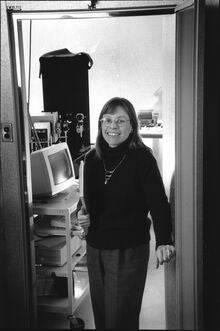
Deborah E. Leckband, Reid T. Milner Professor of Chemistry, was elected as a Fellow to the American Chemical Society. The distinction of Fellow "recognize[s] members of the American Chemical Society for outstanding achievements in and contributions to Science, the Profession, and the Society." The distinguished honor of a Fellows designation will go to those who have distinguished themselves in multiple areas, including promoting the science, the profession, and service to the American Chemical Society.
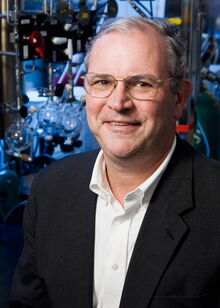
Thomas B. Rauchfuss, William H. and Janet G. Lycan Professor of Chemistry, was elected as a Fellow to the American Chemical Society. The distinction of Fellow "recognize[s] members of the American Chemical Society for outstanding achievements in and contributions to Science, the Profession, and the Society." The distinguished honor of a Fellows designation will go to those who have distinguished themselves in multiple areas, including promoting the science, the profession, and service to the American Chemical Society.
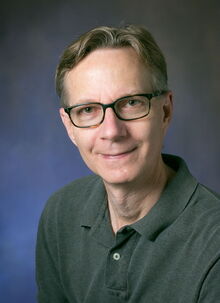
Steven C. Zimmerman, head and Roger Adams Professor of Chemistry, was elected as a Fellow to the American Chemical Society. The distinction of Fellow "recognize[s] members of the American Chemical Society for outstanding achievements in and contributions to Science, the Profession, and the Society." The distinguished honor of a Fellows designation will go to those who have distinguished themselves in multiple areas, including promoting the science, the profession, and service to the American Chemical Society.
July 2009
Neil Kelleher, professor of chemistry, received the 2009 Biemann Medal and a cash award from the American Society for Mass Spectrometry at the society's annual conference. The award recognizes a significant acheivement in basic or applied mass spectrometry made by an individual early in his or her career.
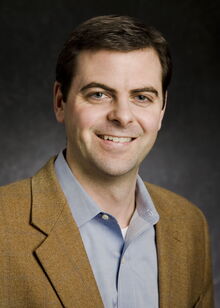
Martin Burke, professor of chemistry, will receive the 2009 AstraZeneca Excellence in Chemistry Award, presented to academic researchers who have demonstrated distinct potential in synthetic, mechanistic, or bio-organic chemistry. Receipients receive $50,000 unrestricted research grants.
June 2009
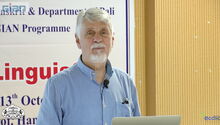
Hans Henrich Hock, professor emeritus of linguistics and Sanskrit, has been invited to be a fellow in the Jawaharlal Nehru Institute of Advanced Studies of Jawaharlal Nehru University, New Delhi. He will work on a publication project on language contact in South Asia and offer a short course in the Centre for Linguistics.
May 2009
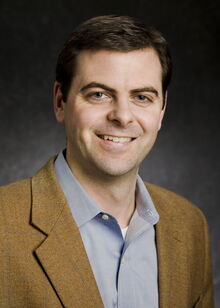
Martin Burke, professor of chemistry, was awarded a 2009 Amgen Young Investigator's Award, which includes an unrestricted grant of $25,000 and the opportunity to present a lecture at an Amgen symposium in October. The award recognizes young chemists who are making significant contributions to the field of organic chemistry and pharmaceutical research.
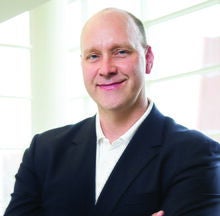
Chad Rienstra, professor of chemistry, received the Founders Medal from the International Conferences on Magnetic Resonance in Biological Systems. The award cited Rienstra's innovative work in the area of solid-state NMR methodology and applications to determine protein structures. The award is given to a scientist under age 41 who has made exceptional contributions to developments and/or progress in the area of magnetic resonance in biological systems.
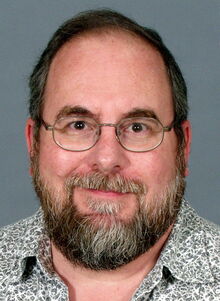
Ken Suslick, professor of chemistry, received the 2009 Student Council Mentoring Award from the Acoustical Society of America. The council presents this award every 18 months to recognize exemplary mentors who guide the academic and/or professional growth of students and junior colleagues.
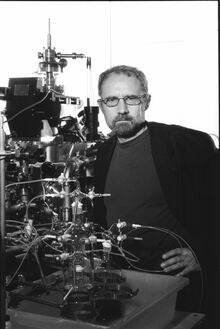
Andrzej Wieckowski, professor of chemistry, has been appointed a fellow of the International Society of Electrochemistry. A member is named a fellow "in recognition of her/his continuing outstanding scientific and/or technical achievement within the field of electrochemistry." Fellows will be inducted in August at the annual meeting in Beijing.
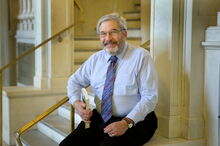
Mark Leff, associate professor of history, Bruce Reznick, professor of mathematics, Katherine Wahl, teaching associate of mathematics, and John Griswold, lecturer of English, have been honored with the Campus Award for Excellence in Undergraduate Teaching. The award recognizes professors, instructional staff members, and graduate teaching assistants who display consistently excellent performance in the classroom, take innovative approaches to teaching, positively affect the lives of their students, and make other contributions to improved instruction, including influencing the curriculum.
Philippe Tondeur, professor of mathematics (emeritus), was named a Fellow by the Society for Industrial and Applied Mathematics (SIAM). Fellowship is an honorific designation conferred on members distinguished for their outstanding contributions to the fields of applied mathematics and computational science. He was cited for leadership in science policy.
Donald Burkholder, professor of mathematics (emeritus), was named a Fellow by the Society for Industrial and Applied Mathematics (SIAM). Fellowship is an honorific designation conferred on members distinguished for their outstanding contributions to the fields of applied mathematics and computational science. He was cited for his advances in martingale transforms and applications of probabilistic methods in analysis.
April 2009
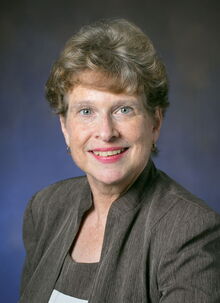
Valerie Hoffman, associate professor of religious studies, was selected as a 2009 Carnegie Scholar. The Carnegie Scholars Program seeks to promote American understanding of Islam as a religion and the characteristics of Muslim societies, particularly American Muslim communities. The title of Hoffman’s project is “Islamic Sectarianism Reconsidered: Ibadi Islam in the Modern Age.” Her exploration of Ibadism’s responses to globalization will shed light on the potential for a rigid, closed sect to embrace the diversity of the global age. The resulting book will fill a significant gap in the field and enhance both academic and public understanding of the distinctive nature of modern Ibadism.
Paul Kwiat, Bardeen professor of physics and electrical and computer engineering, is among the 360 Outstanding Referees of the Physical Review and Physical Review Letters journals by the American Physical Society, chosen by the journal editors for 2009. The program recognizes scientists who have been helpful in assessing manuscripts for publication in the society's journals.
Michael Stone, professor of physics, is among the 360 Outstanding Referees of the Physical Review and Physical Review Letters journals by the American Physical Society, chosen by the journal editors for 2009. The program recognizes scientists who have been helpful in assessing manuscripts for publication in the society's journals.
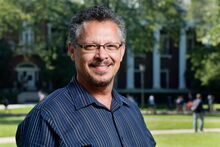
Alejandro Lugo, associate professor of anthropology and Latina/o studies, received a 2008 Southwest Book award from the Border Regional Library Association for his book Fragmented Lives, Assembled Parts: Culture, Capitalism, and Conquest at the U.S.-Mexico Border. The award is presented in recognition of outstanding books about the Southwest published in any genre and directed toward any audience.
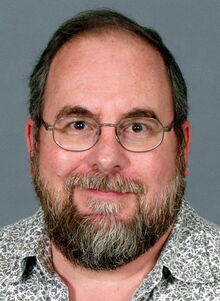
Kenneth Suslick, Marvin T. Schmidt professor of chemistry and professor of materials science and engineering, was recognized as an MRS Fellow by the Materials Research Society. Fellowship is awarded to one whose sustained and distinguished contributions to the advancement of materials research are internationally recognized.
March 2009
Michael Palencia-Roth, Trowbridge Scholar in Literary Studies and professor of comparative and world literature, has been appointed to a multi-year term as senior adviser to the Institute of Moralogy, Reitaku University, Japan. He is the third senior adviser and the first international one in the history of the institute.
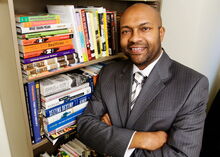
Jabari Asim, scholar-in-residence in African American studies and journalism, received the 2009 AABHE Distinguished Cultural Award from the American Association of Blacks in Higher Education. This award is given to those individuals whose body of work has documented the black American experience.
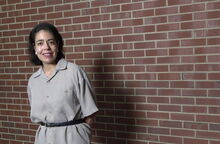
Danuta Shanzer, professor of classics and medieval studies, was elected as a Fellow of the Medieval Academy. Fellows are scholars who have made notable contributions to the furthering of the stated purpose of the academy, which is to support the research, publication, and teaching of all aspects of the Middle Ages.
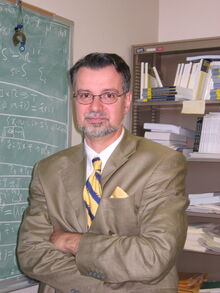
Nicholas Yannelis, Commerce Distinguished Alumni professor of economics, has become the editor of Economic Theory. Economic Theory provides an outlet for research in all areas of economics based on rigorous theoretical reasoning and on topics in mathematics that are supported by the analysis of economic problems.
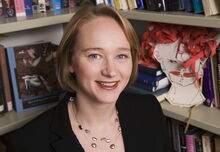
Anna Westerstahl Stenport, assistant professor of Germanic languages and literatures, Scandinavian studies, cinema studies, comparative and world literature, and gender and women's studies, has been awarded a fellowship for postdoctoral research in Scandinavian studies by the Scandinavian American Foundation. The award is for her book project concerning new models of cinema production at the Swedish Film Institute and Film i Väst. The award carries a travel and research stipend for research on contemporary Swedish film and the Scandinavian film industry.
Harry Triandis, professor of psychology (emeritus), has won the Eminent Scholar Award in International Management from the Academy of Management. The award is "aimed at recognizing a body of scholarship that has profound impact on international management and business scholarship, research, and practice. The recipient is meant to embody a mixture of new thought and effective communication into the community." He will give a talk and receive the award at the Academy of Management conference in Chicago on August 11.
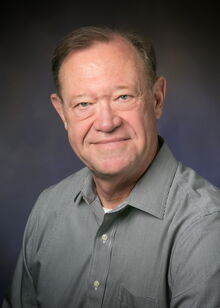
Frederick Hoxie, Swanlund professor of history, has been named a professor in the Center for Advanced Study (CAS). CAS professors are permanent members of the center, selected from the faculty on the basis of their outstanding scholarship. These appointments are among the highest forms of campus recognition.
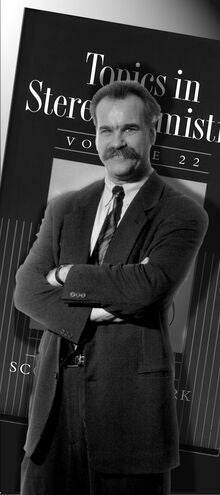
Scott Denmark, R.C. Fuson Professor of Chemistry, has been awarded the Herbert C. Brown Award for creative research in synthetic methods from the American Chemical Society. Denmark’s most seminal contribution is laying the theoretical foundation and exploiting the manifestations of Lewis base activation of Lewis acids, a counterintuitive phenomenon.
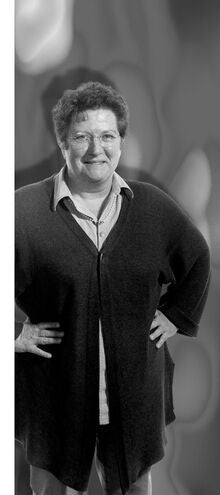
Ziada (Zan) Luthey-Schulten, professor of chemistry, was named a William H. and Janet G. Lycan professor of chemistry. This professorship is awarded to exceptional faculty in the School of Chemical Sciences.
February 2009
Benjamin McCall, assistant professor of chemistry and astronomy, received a 2009 Sloan Research Fellowship from the Alfred P. Sloan Foundation. The Sloan Research Fellowships seek to stimulate fundamental research by early-career scientists and scholars of outstanding promise. These two-year fellowships are awarded yearly to researchers in recognition of distinguished performance and a unique potential to make substantial contributions to their field.
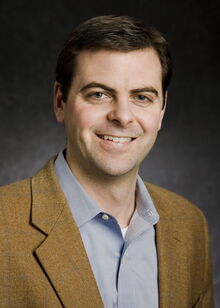
Martin Burke, assistant professor of chemistry, received a 2009 Sloan Research Fellowship from the Alfred P. Sloan Foundation. The Sloan Research Fellowships seek to stimulate fundamental research by early-career scientists and scholars of outstanding promise. These two-year fellowships are awarded yearly to researchers in recognition of distinguished performance and a unique potential to make substantial contributions to their field.
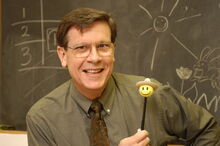
Ed Diener, Alumni Distinguished Professor of Psychology (emeritus), was a recipient of the 2008 American Publishers Award for Professional and Scholarly Excellence (PROSE) for prose work in the field of psychology, for his recent book Happiness: Unlocking the Mysteries of Psychological Wealth.
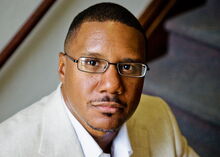
Clarence Lang, associate professor of African American studies and history, received the 2009 EBSCOhost America: History and Life Award for his article “The ‘Long Movement’ as Vampire: Temporal and Spatial Fallacies in Recent Black Freedom Studies,” which he coauthored with Professor Sundiata Cha-Jua. The EBSCOhost America: History and Life Award is a biennial award given to recognize and encourage scholarship in American history in the journal literature advancing new perspectives on accepted interpretations or previously unconsidered topics.
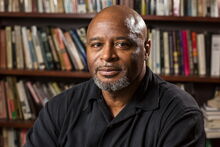
Sundiata Cha-Jua, associate professor of African American studies and history, received the 2009 EBSCOhost America: History and Life Award for his article “The ‘Long Movement’ as Vampire: Temporal and Spatial Fallacies in Recent Black Freedom Studies,” which he coauthored with Professor Clarence Lang. The EBSCOhost America: History and Life Award is a biennial award given to recognize and encourage scholarship in American history in the journal literature advancing new perspectives on accepted interpretations or previously unconsidered topics.
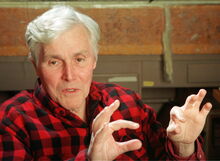
Carl Woese, the Stanley O. Ikenberry Professor of Microbiology, will be honored by the 2009 American Society for Microbiology with the Abbott-ASM Lifetime Achievement Award this May. This is the society’s premier award for sustained, remarkable contributions to the microbiological sciences.
January 2009
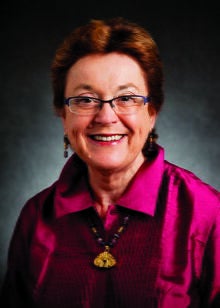
Elizabeth Lowe, director of the Center for Translation Studies, was recognized on the list of "Outstanding Academic Titles" for 2008 by Choice: Current Reviews for Academic Libraries. She was recognized for her work "Translation and the Rise of Inter-American Literature" (University Press of Florida, 2007). Titles are chosen based on their overall excellence in presentation and scholarship, importance relative to other literature in the filed, and distinction as a first treatment of a subject.
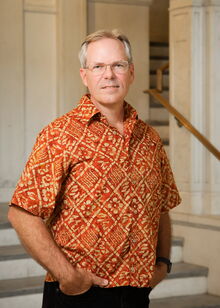
Christopher Fennell, assistant professor of anthropology, working with other archaeologists, historians, and volunteers, has succeeded in having New Philadelphia, Ill., recognized as a National Historic Landmark. New Philadelphia was the first town established by a free African American before the Civil War. New Philadelphia was placed on the National Register of Historic Places in 2005, nominated for National Historic Landmark status in 2008, and received National Historic Landmark status on January 16, 2009.
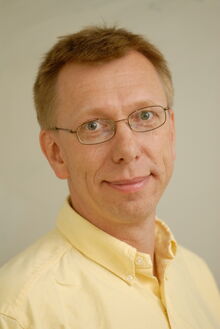
Wilfred van der Donk, Richard E. Heckert endowed chair in chemistry, received the 2009 OBC Lecture Award from the Royal Society of Chemistry's journal Organic & Biomolecular Chemistry in recognition of his contribution to the field of bioorganic chemistry, particularly related to lantibiotics and molecular processes associated with resistance to antiobiotics and bacterial infections. The award is given to chemists who have made a significant research contribution to organic or bioorganic chemistry. The lecture will be given as part of the Natural Products symposium at the 42nd IUPAC congress, to be held in Glasgow, Scotland, August 2-7.
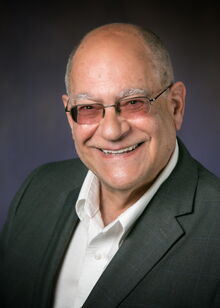
Jay Bass, professor of geology, was elected a Fellow of the American Geophysical Union. Only one in each 1,000 members is elected to the Fellowship each year. Nominations for this honor are reserved for those who have made exceptional scientific contributions and who have attained acknowledged eminence in Earth and space science. The Fellowships will be awarded at an Honors Ceremony this May.
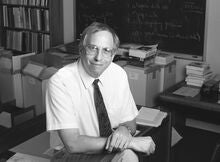
Don Wuebbles, professor of atmospheric sciences, was elected a Fellow of the American Geophysical Union. Only one in each 1,000 members is elected to the Fellowship each year. Nominations for this honor are reserved for those who have made exceptional scientific contributions and who have attained acknowledged eminence in Earth and space science. The Fellowships will be awarded at an Honors Ceremony this May.
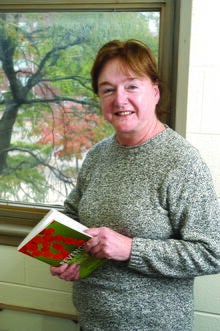
Abigail A. Salyers, professor of microbiology, will be awarded the American Society for Microbiology’s 2009 Graduate Microbiology Teaching Award. This award recognizes distinguished teaching of microbiology and mentoring of students at the graduate and postgraduate levels. The award will be presented during the society’s 109th general meeting in May. The society is the world’s oldest and largest life science organization and has more than 43,000 members worldwide.
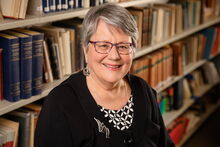
Mara R. Wade, professor of Germanic languages and literatures, was elected the chair of the International Society for Emblem Studies. The society exists to foster the study of emblem books and related materials in literature and the visual arts, their origins and influence on other cultural forms, in all periods, countries, and languages.
December 2008
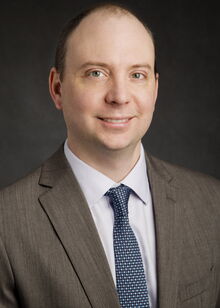
Charles Schroeder, professor of chemical and biomolecular engineering, has been named one of “Tomorrow’s PIs” by Genome Technology magazine. Investigators were selected for their innovative work and research in a discipline that’s part of the systems biology field, as well as for being early in their careers as scientists.
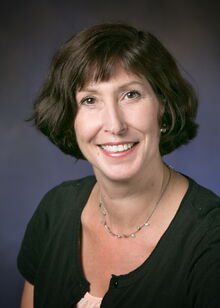
Carol Symes, associate professor of history and medieval studies, received the Herbert Baxter Adams Prize from the American Historical Association for her book A Common Stage: Theater and Public Life in Medieval Arras. The Adams Prize is awarded annually for a distinguished first book of a scholar in European history.
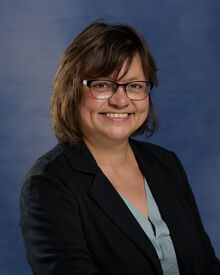
Zsuzsa Gille, associate professor of sociology, received an honorable mention for the Davis Center Book Prize in Political and Social Studies from the American Association for the Advancement of Slavic Studies for her book From the Cult of Waste to the Trash Heap of History. The Davis Center Book Prize is awarded annually to an outstanding monograph on Russia, Eurasia, or Eastern Europe in anthropology, political science, sociology, or geography.
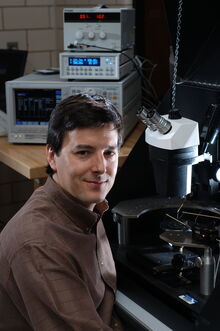
John Rogers, professor of chemistry and founding professor of materials science and engineering, has been selected as a National Security Science and Engineering Faculty Fellow. He is one of only six distinguished university faculty scientists and engineers selected from a field of over 650 for the 2009 award. As part of the award, Rogers will receive $3 million over five years to conduct research concerning technological developments that will benefit the Department of Defense. Rogers' research includes fundamental and applied aspects of nano and molecular scale fabrication as well as materials and patterning techniques for unusual format electronics and photonic systems.
November 2008
Kent Ono, professor of Asian American studies, is a recipient of the 2008 Charles H. Woolbert Research Award from the National Communication Association for his article with John M. Sloop of Vanderbilt University, "The Critique of Vernacular Discourse." This award is given for articles that have stood the test of time and have become stimuli for new conceptualizations of speech communication phenomena.
Xuming He, professor of statistics, earned the rank of Fellow of the American Association for the Advancement of Science, for his contributions to the theory and applications in nonparametric and robust statistics, and for distinguished service to the profession as an editor and National Science Foundation program director.
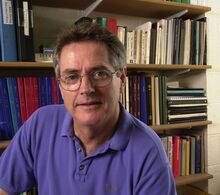
Patrick Weatherhead, professor of animal biology, earned the rank of Fellow of the American Association for the Advancement of Science, for biological sciences. Weatherhead was chosen for his distinguished contributions to the field of animal behavior and ecology, particularly empirical studies of reproductive behavior and sexual selection in birds and snakes.
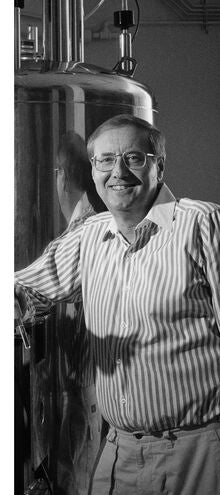
Eric Oldfield, professor of chemistry, earned the rank of Fellow of the American Association for the Advancement of Science, for chemistry. Oldfield was selected for his contributions to biological magnetic resonance, including chemical shift analysis and development of anti-malarial drugs.
Jeff Brawn, professor of animal biology and natural resources and environmental sciences, earned the rank of Fellow of the American Association for the Advancement of Science, for biological sciences. Brawn was recognized for his contributions to the field of avian population biology, specifically for studies in avian demography and comparative life history evolution in temperate and tropical birds.
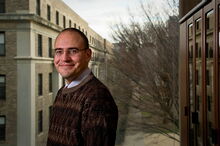
Richard Braatz, professor and Millennium Chair of chemical and biomolecular engineering, earned the rank of Fellow of the American Association for the Advancement of Science, for engineering. Braatz was chosen for his contributions to the field of control engineering, particularly for the control of chemical, materials, and pharmaceutical processes.